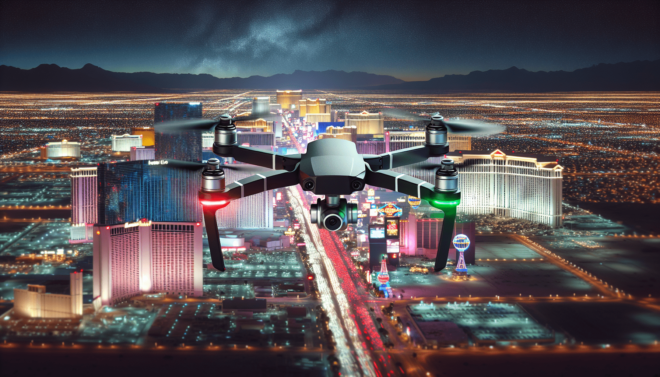Have you ever wondered how the unique regulations in Las Vegas impact your ability to use drones for video recording? Whether you’re a hobbyist, professional videographer, or just someone curious about the subject, understanding these regulations is crucial. Let’s explore the intricacies of Las Vegas drone laws and how they might affect your aerial activities.
Understanding Drone Regulations in Las Vegas
Flying a drone in Las Vegas is not as straightforward as it might seem. Due to the city’s unique geographical and operational characteristics, specific rules govern drone usage. These regulations ensure safety, public privacy, and the smooth flow of city activities.
Federal Regulations Overview
Before diving into the specifics of Las Vegas, it’s essential to understand the overarching federal regulations managed by the Federal Aviation Administration (FAA).
-
Drone Registration
- Requirement: All drones weighing more than 0.55 pounds (250 grams) and less than 55 pounds must be registered with the FAA.
- Cost: $5 for a three-year registration.
- Consequences: Failing to register could result in civil and criminal penalties.
Table 1: FAA Registration Details
Weight Criteria Registration Requirement Cost Duration 0.55 to 55 pounds Yes $5 3 years Less than 0.55 pounds No N/A N/A -
Flying Restrictions
- Altitude Limit: Maximum altitude is 400 feet.
- Line-of-Sight: You must maintain visual contact with your drone.
- No Fly Zones: Prohibited areas include near airports, emergency sites, and specific city-designated locations.
State-Specific Regulations in Nevada
Beyond federal laws, Nevada has state-specific regulations that affect drone usage, including operational nuances exclusive to Las Vegas.
-
State Registration: In addition to FAA registration, if you use your drone for commercial purposes, you must register with the Nevada Department of Transportation (NDOT).
-
Privacy Concerns:
- Illegal Surveillance: Using drones to capture or record individuals without consent is prohibited.
Table 2: Nevada State Regulations
Requirement Regulation Authority State Registration Mandatory for commercial use NDOT Privacy No surveillance or recording without consent Nevada Privacy Act
Las Vegas-Specific Regulations
Las Vegas, known for its bustling Strip, intricate city layout, and nearby military installations, imposes strict regulations on drone activities.
Prohibited Areas and No-Fly Zones
-
Las Vegas Strip: Due to dense population and heavy air traffic, flying drones along the Strip is heavily regulated. Without explicit permission, it’s best to avoid this area.
-
Airports and Military Bases: Las Vegas is home to several busy airports and military bases. McCarran International Airport (LAS) and Nellis Air Force Base have strict no-fly zones.
-
National Parks: Close proximity to several national parks like Red Rock Canyon means additional restrictions.
Table 3: Las Vegas No-Fly Zones
Location Regulation Las Vegas Strip Prohibited without explicit permission Airports Strict no-fly zones Military Bases Prohibited National Parks Restricted
Recreational vs. Commercial Use
The rules for recreational and commercial drone use differ significantly within Las Vegas. Ensuring clarity can prevent legal issues and enhance the quality of your video recordings.
Recreational Use
For recreational use, Las Vegas mandates adherence to standard FAA regulations along with additional city-specific guidelines.
- Flying Altitude: Maintain under the 400-foot threshold.
- Away from Crowds: Avoid flying over crowds and recreational areas.
- Permits: No special permits needed, but awareness of no-fly zones is crucial.
Commercial Use
Commercial use involves stricter scrutiny. Whether you’re shooting for a film, real estate project, or event coverage, compliance is essential.
-
FAA Certification: You need to hold a Remote Pilot Certificate issued by the FAA.
-
City Permits: Obtain necessary permissions from the Las Vegas municipal authorities.
-
Insurance: Carry sufficient liability insurance to cover any potential damages.
Table 4: Recreational vs. Commercial Use
Criteria Recreational Use Commercial Use Altitude Below 400 feet Below 400 feet Over Crowds Prohibited Prohibited Certification Not required Remote Pilot Certificate required City Permits Not required Mandatory Insurance Not mandatory Required
Steps for Legal Drone Operation in Las Vegas
To ensure you’re operating within legal boundaries, follow these steps to safely and legally use drones for video recording in Las Vegas.
Step 1: Understand and Register
Make sure your drone meets weight criteria and register it with both the FAA and NDOT if necessary.
Step 2: Acquire Necessary Certifications
For commercial operations, securing an FAA Remote Pilot Certificate is non-negotiable.
Step 3: Obtain City Permits
Visit the Las Vegas city administration’s website to learn about permit requirements. Providing details about your filming project can expedite this process.
Step 4: Plan Your Flight Route
Mapping out your flight route to avoid no-fly zones ensures compliance and safety.
Step 5: Conduct Pre-Flight Checks
Perform routine pre-flight inspections of your drone to check for any malfunction or potential hazard.
Advantages of Adhering to Regulations
Sticking to Las Vegas drone regulations isn’t just about avoiding fines or bans. There are several benefits to compliance, enhancing your overall drone videography experience.
Safety First
Adhering to these regulations ensures the safety of others and your drone. Accidents can be avoided with mindful piloting.
Professional Standards
Following the rules reflects professionalism, increasing the credibility of your work whether for personal projects or commercial ventures.
Legal Protection
Staying within legal limits protects you from potential lawsuits or claims for damages, especially in commercial projects.
Increased Opportunities
Being compliant opens doors for shooting in restricted areas through special permits, thereby enhancing the scope of your projects.
Common Mistakes to Avoid
When flying drones in Las Vegas, mistakes can be costly. Here are common pitfalls and how to avoid them.
Ignoring No-Fly Zones
Flying in restricted areas such as the Las Vegas Strip or near airports can lead to severe penalties. Always check no-fly zones before operating.
Lack of Registration and Certification
Not registering your drone or failing to obtain necessary certifications can result in legal repercussions. Ensure all paperwork is in order.
Inadequate Planning
Poor flight route planning can lead to accidental breaches into restricted zones. Use mapping tools to outline your route carefully.
Insufficient Insurance
For commercial usage, lack of proper insurance can be a severe oversight. Always have adequate coverage to handle potential damages.
Tips for Better Video Recording within Regulations
Maximizing the quality of your drone video recordings while staying within regulatory limits can be challenging. Here are some tips to help you achieve the best results.
Optimal Time of Day
Flying during the golden hours (just after sunrise and before sunset) offers the best lighting conditions for video recording.
Stable Footage
Using a drone with a high-quality gimbal ensures stable video footage, making post-production edits easier and more effective.
Avoiding Crowds
Filming in less crowded areas not only helps you stay compliant with regulations but also ensures unobstructed, clean footage.
Weather Conditions
Check the weather forecast before planning your shoot. Windy conditions can be detrimental to both safety and video quality.
Conclusion
Understanding and adhering to drone regulations in Las Vegas is essential for a fruitful and stress-free drone video recording experience. Whether you’re flying recreationally or for commercial purposes, being aware of the laws and planning accordingly can significantly enhance your work. Remember, compliance is not just about following rules but also about ensuring safety and professionalism, ultimately opening doors to more opportunities and better-quality recordings.

